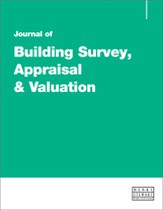Climate change and the new building regulations : Limitations and urgent opportunities for construction and building design over the next 25 years
Abstract
There is a scientific consensus that further delay to preventive and mitigative action addressing human-induced climate change represents costly and existential danger, with no inhabited region of the earth unaffected. The UK must transition to net zero by 2050. It is estimated that 35–40 per cent of UK emissions result from building use, with 5–10 per cent from the construction industry. A majority of buildings designed or in use today are not sufficiently prepared for this transition. This affords those working in building design and construction unique and critical opportunities for positive change and damage limitation. There is a consensus of expertise that prior to 2050, almost every new and existing UK building will need to be heated with an electric heat pump and have a greatly reduced energy demand. This represents a significant retrofit challenge, which there are insufficient plans or progress to address. More stringent building regulations for proposed buildings’ operational energy use were introduced in 2022. More may imminently follow, though there is concern from the industry that these plans lack the scope and ambition required. Despite broad support, no building regulations limiting embodied carbon exist or are proposed. Projected increases in the frequency, length and severity of heatwaves mean that UK buildings designed for past conditions are unlikely to remain useful or habitable throughout their lifespan. Existing methodologies to assess and mitigate this risk, sometimes a requirement of planning policy, now feature within the new Building Regulations Part O.
The full article is available to subscribers to the journal.
Author's Biography
Sean Mills is sustainability consultant with over a decade of experience in the construction industry. He is a qualified CIBSE Low Carbon Consultant, Non Domestic Energy Assessor, On Construction Domestic Energy Assessor and BREEAM Assessor.
Citation
Mills, Sean (2025, June 1). Climate change and the new building regulations : Limitations and urgent opportunities for construction and building design over the next 25 years. In the Journal of Building Survey, Appraisal & Valuation, Volume 14, Issue 1. https://doi.org/10.69554/TBDZ1326.Publications LLP
